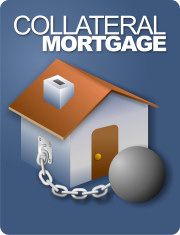Big Bank Launches Collateral Mortgage to Spur Market; Takers Will Be Bound
Despite all-time interest rate lows, the Canadian mortgage market has started to see a cooling; especially for big banks and in major cities Toronto and Vancouver.
And what, you may ask, is TD’s strategy to stay afloat in a competitive mortgage market which has seen the Canadian home buyer’s business increasingly shifted towards mortgage brokers? As of October 18, 2010, all mortgages issued by TD Bank will be collateral mortgages.
Though other banks and credit unions offer collateral mortgage variations, including Royal Bank with its readvanceable mortgage, TD has taken the big step of launching a collateral product that will register up to 125 per cent of the property’s value. The catch? You cannot switch out of this product without cashing out or paying a large sum in legal fees.
In attaining a traditional, or conventional mortgage, you are granted a specific principal loan amount and a specific amortization period, in which time you can more or less expect to pay down that principal amount, with the addition of premiums based on terms within that amortization period. For example, your amortization may be set at 25 years, and within that you may select five five-year terms all at the current fixed rates available at the time in which you secure the term.
If rates escalate, or other life circumstances arise that necessitate your need for increased cash flow, you have several options. You may extend that amortization period to 30 or 35 years, often without penalty, or access to the equity you have built in your property. You may refinance your mortgage to a lower rate or to decrease monthly payments, or draw a Home Equity Line of Credit (HELOC) on your home loan. A HELOC will allow you access to a percentage of your home’s value, to pay down and re-charge as you wish, often with the option of paying interest-only, with no need to re-qualify.
A collateral mortgage is secured by a promissory note with a lien on the mortgaged property in, basically, any amount registered. With the TD collateral mortgage product, the registered amount can be up to 125 per cent of the property value, meaning you may register debt largely in excess of your home’s actual worth. Like a revolving line of credit, the collateral mortgage allows you to re-advance your principal. Though TD states this allows customers access to funds with no need to re-register or pay registration fees, but each case will need be inspected by the bank to ensure the property value substantiates a request for more borrowing, so clients cannot just access funds with pure abandon, despite approval for the product.
The scariest aspect of the collateral mortgage is that interest rates are not fixed. Often is the case that should a borrower miss a payment, rates will sky rocket. Collateral mortgages can be registered at rates as high as prime plus ten per cent.
Buyers should be warned. Acquiring access to a surplus of funds, if indeed you are granted that access after your request is inspected, using your home as collateral is dangerous. Canadian law also states that should a borrower have other outstanding debts with the same lender, such as credit cards or car loans, the lender may link those debts, meaning if you default on one you default on all. If you, or the person you are purchasing property with, are historically bad budgeters, you are putting your home at risk by having access to funds you really do not possess.
Readvanceable mortgages offer their bonuses to certain types of buyers. They afford access to finances to invest with, purchase second properties with, etc. But to a home buyer with less than savvy financial skills, being virtually locked into a collateral mortgage with no fixed rate guarantees, and that offers finances way beyond your current cash holdings, is risky business. While you can still attain a fixed rate of less than four per cent on a five year term, is it worth it to be bound to a product that will afford you very little, to no negotiating room come renewal time, and make it virtually impossible for you to disassociate from?


